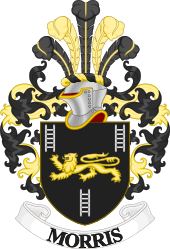
Heraldic fraud may mean either to falsely claim the right to a coat of arms (or other component of heraldic display) for oneself, or to falsely assert that someone else has that right in order to sell heraldic art to them. Both can be seen as a kind of fraud and an infringement of intellectual property rights.
Fraudulent armigers
According to the law of arms in most heraldic jurisdictions, usage of a pre-existing coat of arms must be predicated on a specified form of family relationship. Typically, inheritance of arms flows through the male line, though in some jurisdictions it may under some circumstances flow through the female line as well. Many regions of the world have no official regulation of heraldic matters, so no distinction can be made between fraudulent and legitimate uses on the basis of legality.
Fraudulent heraldic artists
The term "bucket shop" is sometimes used to refer to a company that will sell a coat of arms (often referred to by the misnomer "family crest") associated with the customer's surname, regardless of whether the customer can actually claim a relation to the original armiger.[1][2] Bucket shops may work from a database of surnames and shields sourced from manuscripts, armorials, and various journals.[citation needed] A common indicator of "bucket shop" arms is the display of the surname within what should be the motto scroll.
Legislation
At least one country has passed legislation to clamp down on "bucket shops". In South Africa, it has been an offence since 1980 to furnish someone with a so-called "family coat of arms" without first obtaining a certificate from the State Herald at the Bureau of Heraldry to confirm that the arms are authentic. Non-compliance can result in prosecution, the prescribed penalties being a fine and/or imprisonment.[3]
See also
References
- ^ Justice of the Peace & Local Government Law. Justice of the Peace. 1997. Retrieved 24 August 2012.
- ^ Lynch-Robinson, Sir Christopher Henry (Bart.); Lynch-Robinson, Adrian (1967). Intelligible Heraldry: the application of a mediaeval system of record and identification to modern needs. Heraldic Book Co. p. 119. ISBN 9780806302164. Retrieved 24 August 2012.
- ^ Heraldry Amendment Act 1980 and Heraldry Amendment Act 1982.
Further reading
- "The Privileges of the College of Arms (Concluded)". The Genealogical Magazine, Volume 5. pp. 103–106. Elliot Stock., 1902.
